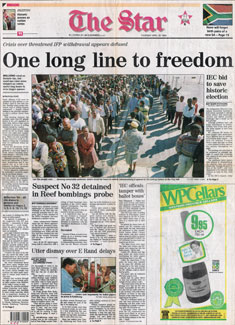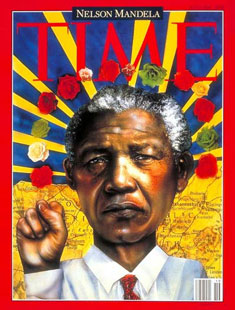History and heritage
South African history: the death of apartheid
- Previous page: Three decades of crisis
First democratic elections
South Africa's first democratic election was held on 26, 27 and 28 April 1994, with victory going to the ANC in an alliance with the Communist Party and Cosatu. Nelson Mandela was sworn in as President on May 10 with FW de Klerk and the ANC's Thabo Mbeki as Deputy Presidents. Mandela's presidency was characterised by the successful negotiation of a new constitution; a start on the massive task of restructuring the civil service and attempts to redirect national priorities to address the results of apartheid; and the Truth and Reconciliation Commission, set up primarily to investigate the wrongs of the past. In the country's second democratic election on 2 June 1999 the ANC marginally increased its majority and Thabo Mbeki became President. The New Nationalist Party, previously the official opposition, lost ground and ceded that position to the Democratic Party, which later became the Democratic Alliance. In 2004 South Africa's third democratic election went off peacefully, with Thabo Mbeki and the ANC again returning to power, and the Democratic Alliance retaining its position as official opposition. Then, three years later, Mbeki lost the presidency of the ANC to his former deputy, Jacob Zuma, and power within the ruling party shifted away from Mbeki. After nearly 10 years as president, Mbeki resigned in September 2008, with Kgalema Motlanthe appointed as "caretaker" president by the National Assembly. In the 2009 elections – democratic South Africa's fourth – the ANC won 65.9% of the vote and Jacob Zuma was elected as president. The Democratic Alliance strengthened its position as opposition, winning 16.7% of the vote as well as the Western Cape. In the 2014 elections – democratic South Africa's fifth – the ANC won 62.1% of the vote, down from the 2009 election, and Jacob Zuma was elected as president. The Democratic Alliance increased its share of the vote from 16.7% to 22.2%, while the newly formed Economic Freedom Fighters (EFF) obtained 6.4% of the vote.
Would you like to use this article in your publication or on your website? See: Using SAinfo material

The peaceful and orderly queues to vote in South Africa's first democratic elections were celebrated on the front page of the Star newspaper on 28 April 1994 (Image: The Star)

On 9 May 1994, the day before Mandela's inauguration as President of South Africa, Time ran in-depth features on the 'miracle' of the country's democratic transformation (Image: Time)


